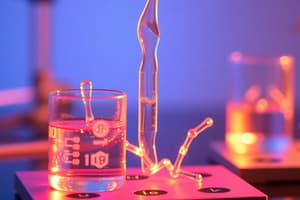Podcast
Questions and Answers
Which type of conductance cannot be directly measured in the laboratory?
Which type of conductance cannot be directly measured in the laboratory?
- Specific conductance
- Equivalent conductance
- Molar conductance (correct)
- None of the above
What is the primary function of a calomel electrode (CE)?
What is the primary function of a calomel electrode (CE)?
- Act as a reference electrode in electrochemical measurements (correct)
- Determine the pH of a solution
- Generate electricity from chemical reactions
- Measure the concentration of ions in solution
In which type of titration can conductometric titration be most effectively applied?
In which type of titration can conductometric titration be most effectively applied?
- Weak acid vs. strong base
- Mixture of acids vs. strong base
- Strong acid vs. strong base (correct)
- Strong base vs. weak acid
What is the role of a glass electrode (GE) in electrochemistry?
What is the role of a glass electrode (GE) in electrochemistry?
Which type of substances form ions in solution and conduct an electric current?
Which type of substances form ions in solution and conduct an electric current?
What is the reciprocal of resistance (R) in terms of conductance (G)?
What is the reciprocal of resistance (R) in terms of conductance (G)?
What is equivalent conductance (Λeq) of an electrolyte defined as?
What is equivalent conductance (Λeq) of an electrolyte defined as?
What determines the value of resistivity or specific resistance (ρ) of a conductor?
What determines the value of resistivity or specific resistance (ρ) of a conductor?
What does molar conductance (Λm) represent?
What does molar conductance (Λm) represent?
Which factor does the specific conductance increase with?
Which factor does the specific conductance increase with?
Which of the following is an example of an electrolyte?
Which of the following is an example of an electrolyte?
What property classifies substances like sodium chloride and potassium nitrate as electrolytes?
What property classifies substances like sodium chloride and potassium nitrate as electrolytes?
Which type of electrode is used for the determination of pH in electrochemistry?
Which type of electrode is used for the determination of pH in electrochemistry?
What does the Nernst equation primarily relate to in electrochemistry?
What does the Nernst equation primarily relate to in electrochemistry?
In terms of conductivity, which category would a superconductor fall under?
In terms of conductivity, which category would a superconductor fall under?
What is the main principle behind conductometric titrations in electrochemistry?
What is the main principle behind conductometric titrations in electrochemistry?
What is the reciprocal of resistance (R) in terms of conductance (G)?
What is the reciprocal of resistance (R) in terms of conductance (G)?
What determines the value of resistivity or specific resistance (ρ) of a conductor?
What determines the value of resistivity or specific resistance (ρ) of a conductor?
Which type of conductance cannot be directly measured in the laboratory?
Which type of conductance cannot be directly measured in the laboratory?
What does molar conductance (Λm) represent?
What does molar conductance (Λm) represent?
Which factor does the specific conductance increase with?
Which factor does the specific conductance increase with?
In which type of titration can conductometric titration be most effectively applied?
In which type of titration can conductometric titration be most effectively applied?
What is equivalent conductance (Λeq) of an electrolyte defined as?
What is equivalent conductance (Λeq) of an electrolyte defined as?
What type of substances form ions in solution and conduct an electric current?
What type of substances form ions in solution and conduct an electric current?
What does specific conductance increase with?
What does specific conductance increase with?
Flashcards are hidden until you start studying




